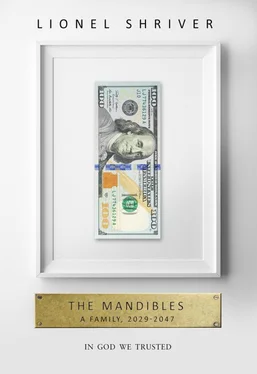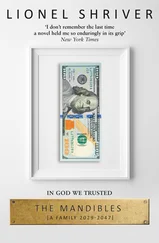“It’s crazy,” Willing said, “but I pictured you owning another farm.”
“How would I do that? No capital, mi amigo . You’ll see. I mean, you and Nollie are welcome to crash here. But even in the land of self-reliance with a negligible flat tax, it could take you a while to swing your own place.”
“I’d hate to part with it,” Willing said. “But selling this goblet might raise enough for a security deposit on a small apartment. The top part is solid gold.”
“But what you complained to me about, when you moved back to Brooklyn?” Jarred said. “The no trajectory problem? Here, in that respect, nothing’s changed. Man, this is the first time in my life I wish I’d earned a degree. Nevadans don’t really need another fifty-something yunk to press, cut, and schlep cheese. They need chemists, and engineers.”
“What would you do,” Nollie said, “if you did have capital?”
“Waste of time to fantasize.”
“Wrong answer,” Nollie said.
Jarred indulged her. “I’d build a gigantic greenhouse. I’d grow lemons .”
“That’s better,” she said, turning to Willing. “What would you do with capital?”
This house was ugly. With its partially constructed rectangles of waist-high walls, the whole development was ugly. But the sunset had been stunning. On the drive into Las Vegas, looming red mountains to the west were impervious to whatever government came and went. The cityscape was goofy; the land on which it sat was austere. The balance was good. A lightness leavened Willing’s body that hadn’t percolated through his limbs since before the Stonage. He personified a favorite chocolate bar when he was small, its muddy cocoa solids pipped with hundreds of air bubbles, so what had been heavy and indigestible became fluffy and almost weightless. He didn’t know what he was doing tomorrow, and he liked that.
“I would earn a degree in hydrology at the University of Nevada, Las Vegas,” Willing said. “I would research how people like Jarred can grow lemons without the USN siphoning so much water from the Colorado River that Arizona brings in the National Guard, and Mexico’s objections to reduced flow over the border create a diplomatic crisis. Only five million people lived in Nevada before secession. Washington can live without the tax take. What will endanger the USN’s independence is water. Tensions with adjacent states over drainage of Lake Tahoe, the Humbolt River, and Lake Mead.”
“My,” Nollie said. “You’ve thought about this.”
“I’ve thought about this,” he said. “I would find some way of contacting Fifa, because it can’t really be that hard. I would get her, and Savannah, and Bing to emigrate here, too. Maybe even Goog, who wouldn’t be such a T-bill if he didn’t work for the Scab. We would live together with Jarred, like Citadel in the old days. But it would be big and airy, not tight and frightened, the way it was in the thirties. Savannah would go back to being an artist and stop being a prostitute. She’d find a man who’s more attractive than I am, and I’d feel jealous. Bing would discover some other calling aside from being a nice guy. Avery and Lowell could retire from Washington to a separate cottage on the same compound. Economists like Lowell don’t believe the USN can work. It would be very enjoyable to watch Lowell live in a place that’s impossible. Jayne and Carter would come down from Montana. Jayne would stop being crazy, because she thinks she wants solitude and really she wants companionship. You would have your private office. Where you can write new books for other people to read because otherwise it could start to get boring here. Then you would die. I would be sad. It would be a good sadness, because it’s not-being-sad when someone dies that’s sad. I would marry Fifa. We would plan to have three children but not be very careful and end up with five.”
“Right answer,” Nollie said, lifting her feet from the box. She peeled off the tired packing tape, folded back the flaps, and removed the top stacks of banded printouts to the floor. She fingered up a pool of candied kumquat drool from the laminated tabletop and moved the Bountiful House goblet out of the way. Struggling even using both hands, from the middle of the carton she withdrew a boxed manuscript titled Better Late Than . When she plunked it on the table, the tequila glasses rattled. She slipped off the top of the mimeo-paper box and removed about fifty pages. “There,” she said. “Capital.”
The box was filled with gold bars.
“I thought you only brought in bancors,” Willing said.
“I didn’t have such unfettered faith in a new currency,” Nollie said. “Any currency. I learned from my father to diversify. I backstopped with precious metal in 1999. The yellow stuff was down to $230 an ounce. You must have some appreciation for what’s happened to the price since.”
“That looks like a large enough trove to interest the USN mint,” Willing said. “The population is rising from refugee Forty-Niners. Larger gold reserves will allow Nevada to gently expand its monetary base without inflation. But I don’t understand how you got this through JFK in the first place.”
“The feds had just nationalized gold,” Nollie reminded him. “No one in their right mind was bringing it into the US. So Customs wasn’t looking for it.”
“The house-jacking,” Willing said. “Now it makes sense. You gave Sam some mouth, but otherwise you were cowed . It wasn’t like you.”
“Took some powerful self-control,” Nollie said. “But I had to get the box out; it was worth far more than Florence’s house. Still, ‘Maxwell’s Silver Hammer’ played in my head the whole walk to Prospect Park.
“Now, my only condition is that you remember this is not manna from the sky. I earned it. By staying up late at a keyboard when my friends were carousing in bars. By reading the same manuscript so many times—in multiple edits, copyedits, first, second, and third passes, and galleys—that I came to hate the sight of my own sentences. By appearing in public events and saying the same thing over and over until I was senseless with self-hatred. By catching seven a.m. flights to literary festivals when I’d rather have slept in. Remember, too, that if I’d not already paid taxes on that metal, there would be twice as much of it. But what’s left I would like you to have. It should stake you for an education, and a home, and a marriage—with enough left over for lemon trees.”
Since he was a boy, Willing had been very interested in economics and not very interested in money. When he learned the value of his great-aunt’s gift in continentals, he was abashed.
He considered what Jarred had said about fairness. His uncle seemed to imply there was no such thing. There were only competing unfairnesses. As Nollie charged him to remember, she had worked hard—harder than some people. So even a one-for-you-and-one-for-me fairness wasn’t exactly fair. The Mandible fortune once destined for his grandfather Carter, and presumably for Nollie as well, though she clearly didn’t need it—that wasn’t fair, either. Which meant the fortune’s evaporation in 2029 wasn’t unfair. Though not-unfair was not the same as fair. So perhaps his endowment from his great-aunt was not-unfair.
In his embarrassment, all he came to understand was the one reliably sound thing to do with money: spend it on someone else. Nollie had enjoyed bestowing her assets on her nephews. His great-great-great-grandfather Elliot, toward the end of his life, would also have husbanded his resources to hand them on.
Willing had rescued the Mandible clan once. It could get to be a habit.
There was indeed an underground railroad—which was neither a railroad, naturally, nor a sequence of safe houses. It was a hodgepodge of unaffiliated freelancers: unchipped codgers in Nevada who knew how to drive—since locals believed, not without reason, that the guidance systems of vehicles set on driverless automatic could be taken over by satellites. Carrying fuel and provisions for the journey, the codgers did runs across the continent for a price.
Читать дальше












